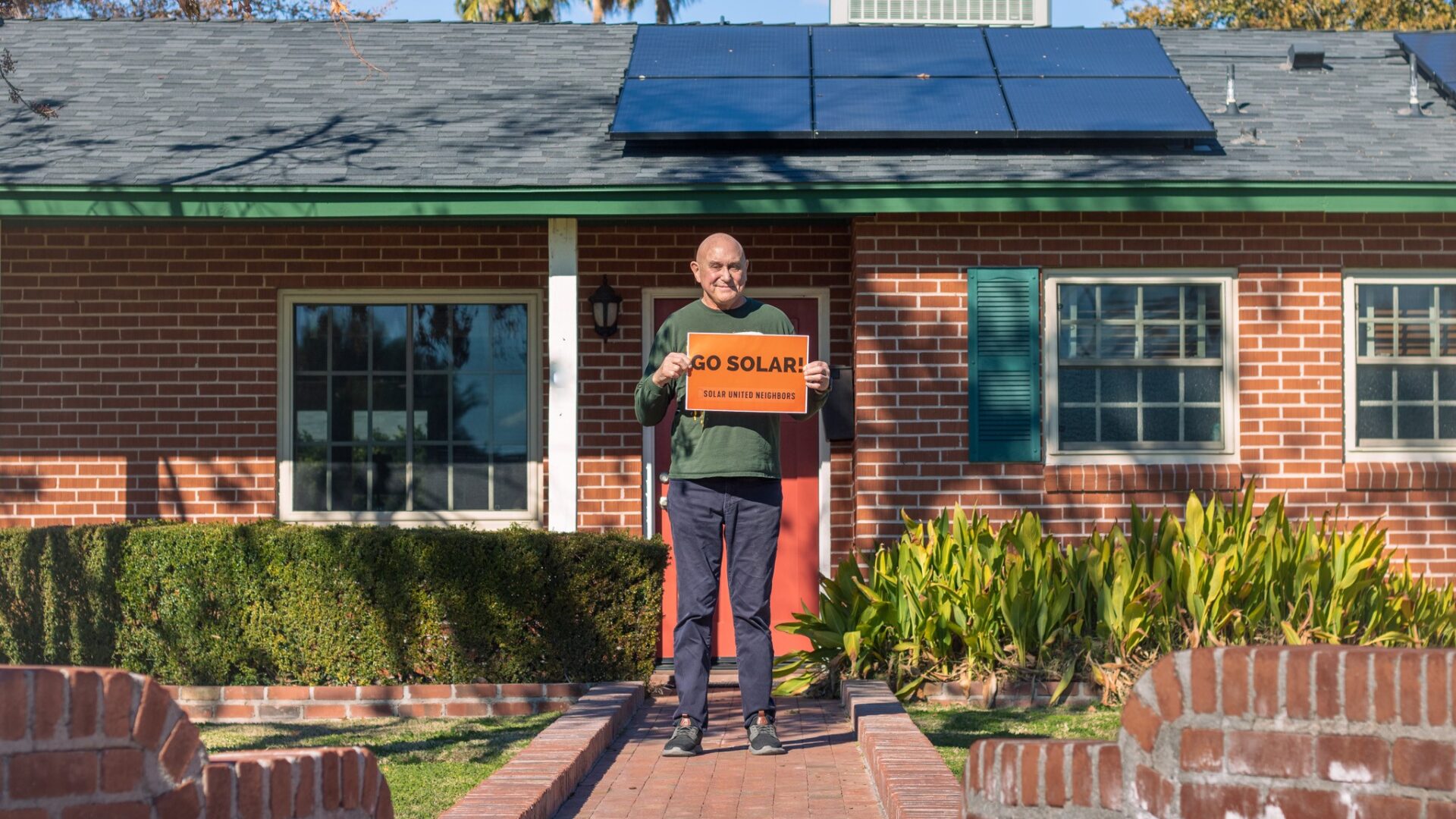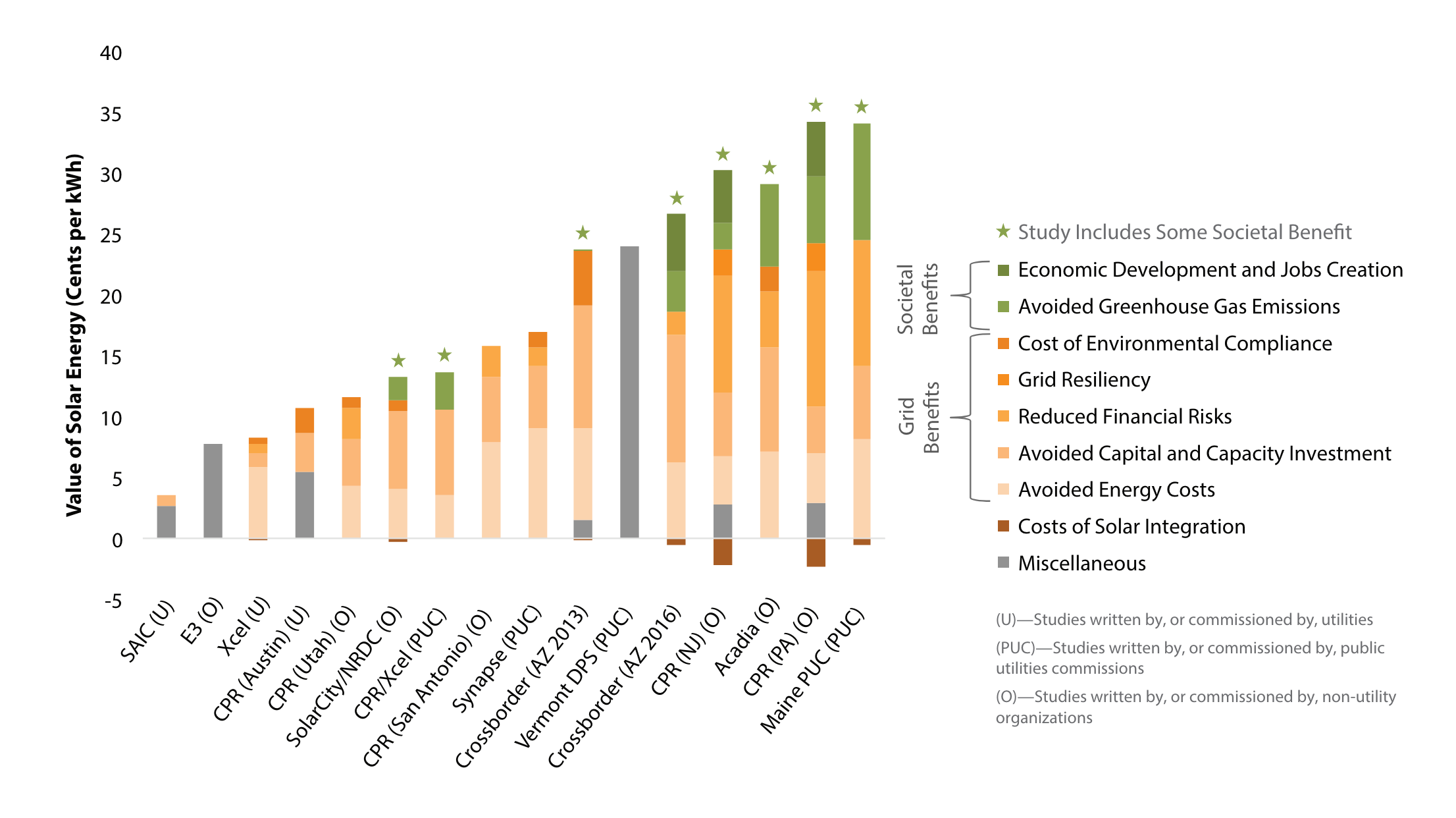The value of solar for everyone
- Factsheet

The benefits of owning your own solar system are obvious. Lower monthly electric bills, an increased home value, and energy independence, to name a few.
But the benefits of solar extend well beyond solar owners. Solar electricity benefits our society at large and our entire electric grid — including all who use it. Here’s how.
Five ways that solar provides value
Beyond the direct bill savings that solar owners enjoy, solar electricity benefits everyone. More solar jobs are good for all Americans; less air pollution improves the health of all Americans; homegrown energy improves national security; and a better-functioning electric grid means cheaper, more reliable power for everyone.
1. Direct benefits to solar owners: When a homeowner or business owner installs solar panels, they generate their own solar electricity. This offsets the electricity they have to purchase from their utility, resulting in lower monthly electric bills. In addition to these savings, rooftop solar boosts home values, earning solar homeowners more when they sell their houses. What’s more, many states offer monetary solar renewable energy credits (SRECs) for solar electricity (separate from your electric bill savings). With SRECs, solar owners can generate additional revenue.
2. Job creation: Helping homes and businesses go solar involves thousands of workers. From panel factory employees to salespeople to electricians and installers, the solar industry now employs more than 250,000 Americans full time. Thanks to homeowners and businesses installing solar panels, all 50 states now have a solar workforce.
3. Public health benefits: Solar electricity does not generate pollution. It requires no water and creates no hazardous waste. The more solar electricity we generate, the less pollution, water shortages, and contamination crises we face. These benefits accrue to everyone, not just solar owners. Whether it’s coming from rooftops or large solar farms, solar electricity is a win for public health.
4. Energy security: With zero fuel inputs, solar is a more secure power source than coal, oil, nuclear, or natural gas. Because there is no need to worry about fuel shortages or fuel costs, everyone benefits from stable power prices. Relying on home-grown solar power instead of imports also means we are less impacted by events in other countries. This protects our military personnel and translates to enormous savings for electricity consumers across the country.
5. Grid improvement: When more solar electricity is generated, the whole electric grid is smarter, stronger, and more efficient. Solar is now the cheapest form of power. So, more solar — regardless of who generates it or where — leads to lower prices for every single utility customer. This is especially true of distributed solar installations such as rooftop solar panels and small-scale commercial installations. On-site distributed solar generation reduces the need to transmit electricity over long distances from distant power plants. So, more solar panels mean less wear and tear on the grid, lower maintenance costs, and fewer expensive utility upgrades. These savings are shared among all ratepayers.
Measuring the value of solar
Sadly, opponents of solar often ignore or downplay its widespread benefits. In a deliberate attempt to slow the growth of solar, many monopoly utilities and fossil fuel companies claim that solar only benefits its owners. That couldn’t be further from the truth.
Thanks to emerging efforts to value solar, we now have the tools to quantify the value that solar energy provides to society at large.
In dozens of states, energy regulators have undertaken processes to quantify the value of solar—both to its residents and to its electric system. This undertaking is widely referred to as a “value of solar” study.
Sometimes studies look at the value of distributed energy resources (DERs) including but not limited to rooftop solar. They’ll also include home energy storage, electric vehicles that can send power to the grid, smart thermostats, and more.
Now, multiple states are attempting to quantify the “value of solar” specifically. Their reasons vary and include:
- Creating a more precise compensation mechanism for solar generation
- Combating solar opponents’ false claims that solar only benefits its owners
- Developing more accurate information for policymakers
- Responding to utilities’ attempts to devalue solar and exaggerate its costs (in the most extreme cases)
It’s not just the traditionally pro-solar states commencing these studies. Many state legislatures recognize the importance of quantifying the value of solar energy their states generate — from Minnesota to Maine (in 2015 and again in 2024), New York to Oregon, blue states, red states, rural states, and urban states. Minnesota pioneered the use of the value of solar to determine the credit for community solar garden subscribers from 2014 to 2023. The current credit for community solar varies depending on the type of subscriber. Learn more from the Institute for Local Self Reliance.
Webinar: Fighting the myth of a solar cost shift
Seeing solar as a threat to profits, monopoly utilities falsely claim it costs non-solar customers. We call B.S.
Net metering undervalues solar
The vast majority of value of solar studies have concluded the same thing: solar is undervalued by retail rate net metering alone.
That’s right. Net metering — the retail rate credit that solar owners receive for the electricity they produce — actually low balls the real value of that electricity. The graph below compares estimates from several studies. The vast majority found the value of solar to be greater than the retail electricity rate.
The outcomes of value of solar undertakings are twofold: to create a financial estimate of the actual value of solar electricity, and to develop a methodology to measure that value moving forward. In efforts that have yielded the former (an actual financial value), you can often see variation in the solar value estimate based on who conducted the study.
Of the 16 studies highlighted below, three of the four with the lowest estimated value of solar were commissioned by utilities. As more value of solar studies and proceedings are initiated across the country, it’s important to keep in mind who is doing them and their vested interests in their outcome.

Source: Environment America. Chart showing retail electricity rates and the value of solar energy in 11 cost-benefit analyses.
Given the countless benefits that solar provides, what is its value? And how do we ensure that the full suite of benefits provided by solar energy is reflected in its price?
Given this value, is net metering enough?
These are the questions central to the debate around the value of solar. Utilities have traditionally compensated solar electricity generated by homes and businesses at the retail electricity rate (i.e. the same rate you pay the utility for electricity). Thanks to net metering, most solar owners are credited at the full retail rate for the solar electricity they feed back onto the grid (when it’s not needed in the home).
Valuing solar electricity at the retail rate has allowed solar owners to directly offset their monthly electric bills with the electricity they produce, translating to major savings. However, as we become more sophisticated at tracking and measuring the different benefits provided by solar, many solar advocates are asking themselves whether this valuation scheme is accurately reflecting the full value of solar.
Given that solar benefits everyone, are solar owners compensated fairly for the solar electricity they produce?
Take a look through the resources below for more information on the true value of solar.
Materials from our webinar: Fighting the myth of the solar cost shift
Webinar recording
Webinar Q&A
One-page summary
Four-page handout
Why solar panels aren’t unfair or a scam
More Resources
Study of the value of solar in Puerto Rico
Valor de la energía solar neta medida en Puerto Rico
Study shows homeowners with PV are subsidizing their neighbors
Michigan Tech study
The true value of solar
Power to the people! Michigan Tech researchers say distributed renewables save utility customers money
Solar in Michigan: the economic impact of distributed generation on non-solar customers
View of solar meta-analysis
How two value-of-solar studies add up to no clear value of solar
Get the latest on solar straight to your inbox.
Fight for your solar rights.
Everyone has the right to go solar. Spread the sunshine nationwide and in your local community by taking action, joining events, and more.